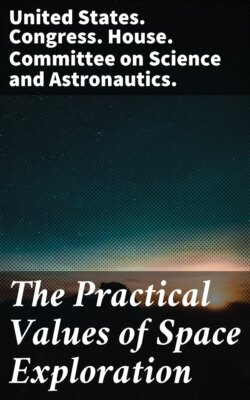Читать книгу The Practical Values of Space Exploration - United States. Congress. House. Committee on Science and Astronautics. - Страница 5
На сайте Литреса книга снята с продажи.
Figure 1.—A single shot of the 8-barreled Saturn of the future will cost millions of dollars, maybe tens of millions. What makes it worthwhile for the taxpayer? I. The Unseen Values
ОглавлениеTable of Contents
The United States has not embarked upon its formidable program of space exploration in order to make or perpetuate a gigantic astronautic boondoggle. There are good reasons, hard reasons for this program. But, in essence, they all boil down to the fact that the program is expected to produce a number of highly valuable payoffs. It not only is expected to do so, it is doing so right now.
Many of the beneficial results can be identified.
Those already showing up are detailed in the sections of this report which follow. They include the most urgent and precious of all commodities—national security. Beyond that, they also include a strengthened national economy, new jobs and job categories, better living, fresh consumer goods, improved education, increased health, stimulated business enterprise and a host of long-range values which may ultimately make the immediate benefits pale into relative insignificance.
Practical uses such as those just listed mean the taxpayer is more than getting his money's worth from American space exploration—and getting a sizable chunk of it today.
Nevertheless, if we can depend on the history of scientific adventure and progress, on its consistent tendencies of the past, then we can be reasonably sure that the greatest, finest benefits to come from our ventures into space are yet unseen.
These are the unpredictable values, the ones which none of us has yet thought of.
Inevitably they lag behind the basic research discoveries needed to make them possible, and often the discoveries are slow to be put to work after they are made. Investors, even governments, are human, and before they invest in something they normally want to know: What good is it?
We can be sure that many American taxpayers of the future will be asking "what good is it?" in regard to various phases of the space program.
There was an occasion when the great Scottish physicist, James Clerk Maxwell, was asked this question concerning one of his classic discoveries in electromagnetism. Maxwell replied: "What good is a baby?"
Now, as then, it takes time for new knowledge to develop and become useful after its conception and birth.
